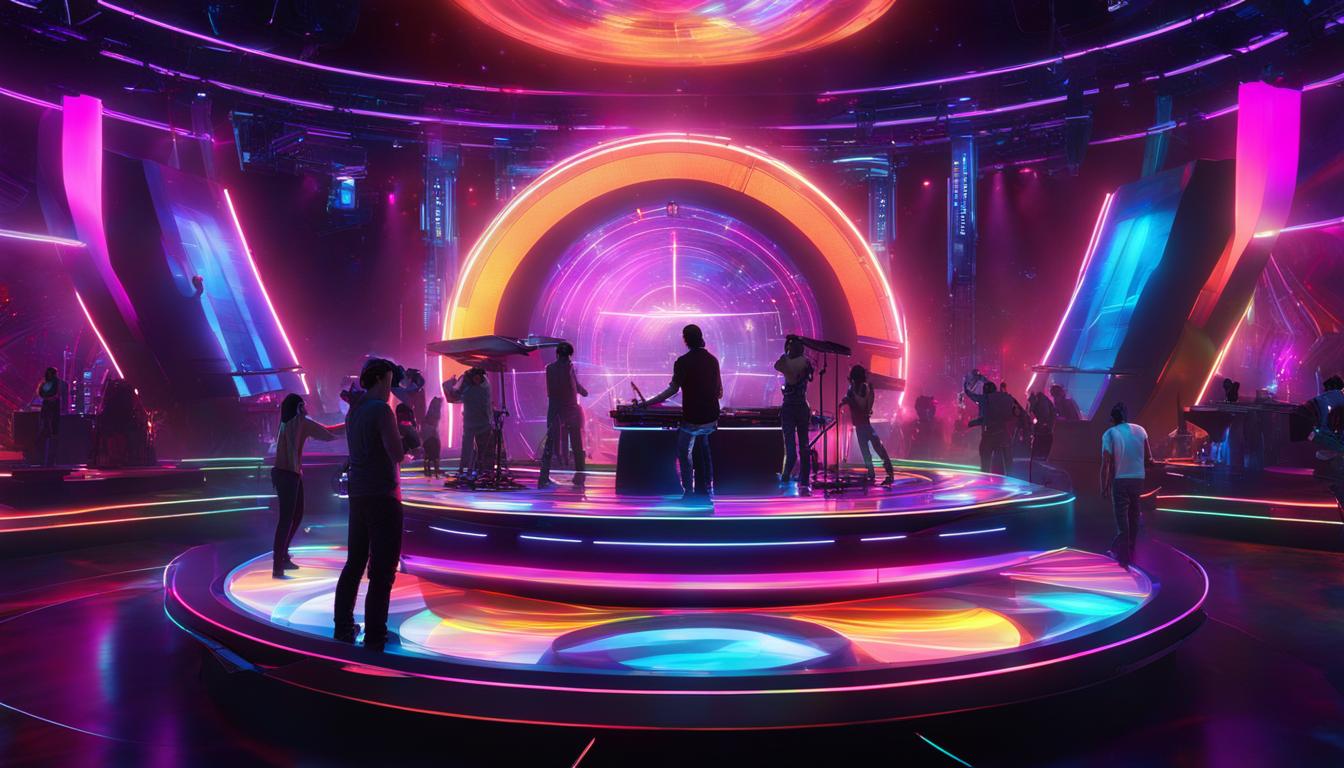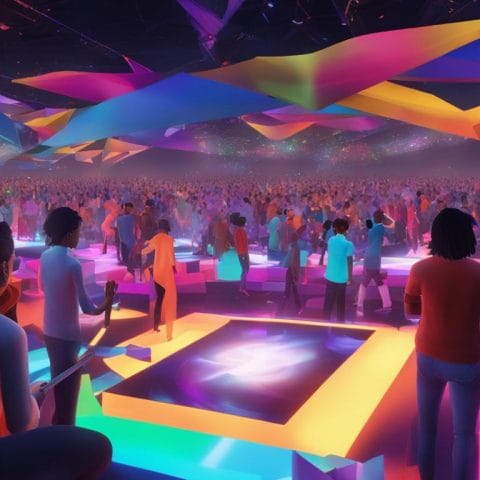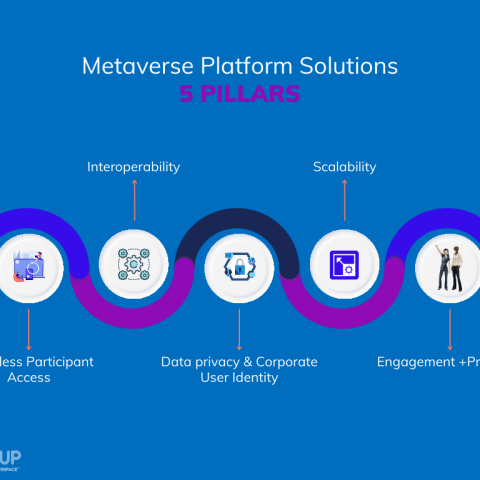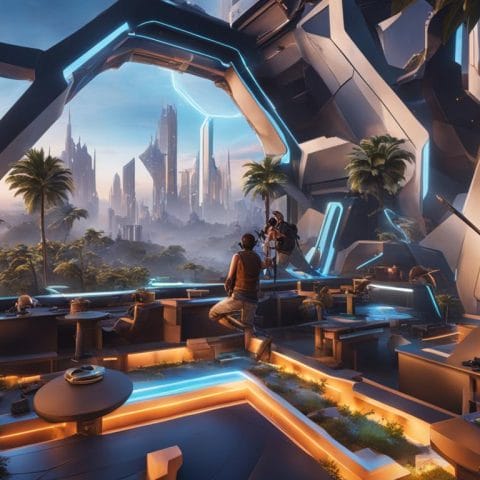As technology continues to advance, the metaverse is becoming a popular platform for hosting events. Metaverse event design focuses on creating immersive and interactive experiences for attendees. By using virtual reality and augmented reality, event planners can design customizable environments that captivate participants. The Hyperspace platform is an example of a metaverse platform that offers a range of customizable environments for creating unique event experiences. With metaverse event design, event planners can bring themes to life and inspire connection and engagement in the digital world.
Key Takeaways:
- Metaverse event design creates immersive and interactive experiences for attendees.
- Virtual reality and augmented reality are used to design customizable environments.
- The Hyperspace platform offers customizable environments for unique event experiences.
- Metaverse event design brings themes to life in the digital world.
- Metaverse events inspire connection and engagement among participants.
What is Metaverse for Events?
The concept of the metaverse for events revolves around the use of augmented reality (AR) and virtual reality (VR) technologies to create dynamic and interactive experiences for event attendees. These immersive technologies allow for the creation of virtual environments where users can interact with each other and digital objects in real-time. By leveraging the power of metaverse technology, event planners can transcend the limitations of physical spaces and provide attendees with truly unique and engaging experiences.
Imagine attending a conference or trade show where you can explore virtual booths, interact with exhibitors, and engage in networking opportunities from the comfort of your own home. With the metaverse, this becomes a reality.
Virtual reality headsets and augmented reality devices transport individuals into virtual spaces, allowing them to navigate and interact with their surroundings through avatars or digital representations of themselves. These avatars can be customized to reflect the attendees’ identities and preferences, creating a personalized and immersive event experience.
| Key Features of Metaverse for Events | |
|---|---|
| Augmented Reality (AR) | Overlaying digital content onto the real world, enhancing physical spaces with digital elements. |
| Virtual Reality (VR) | Creating entirely virtual environments that users can explore and interact with. |
| Interactive Experience | Allowing attendees to engage with each other and digital objects in real-time. |
Through metaverse technology, event planners can break down geographic barriers and provide global accessibility to their events. Attendees from anywhere in the world can participate without the need for travel, reducing costs and carbon footprint. This opens up new possibilities for connecting with a diverse audience and fostering collaboration and knowledge-sharing on a global scale.
In conclusion, metaverse technology offers event planners a powerful tool to create immersive, interactive, and inclusive event experiences. With the continued advancement of augmented reality and virtual reality technologies, the metaverse is set to revolutionize the way we think about and experience events in the future.
Metaverse Event Types
Metaverse events encompass a wide range of event types, offering diverse and engaging experiences for attendees. Whether it’s a fully virtual event or a hybrid combination of physical and virtual elements, metaverse event design allows for limitless creativity and customization. Here are some of the most popular metaverse event types:
Virtual Events
Virtual events take place entirely in the metaverse, providing a fully immersive and interactive experience for attendees. From virtual conferences and trade shows to concerts and expos, these events leverage the immersive nature of the metaverse to connect with a global audience. Participants can create avatars, explore virtual environments, and engage with digital content in real time.
Hybrid Events
Hybrid events combine both physical and virtual components, offering a balance between in-person and remote participation. These events can include live streaming of physical event activities, virtual networking sessions, and interactive elements for both on-site and virtual attendees. Hybrid events provide increased accessibility and flexibility, allowing participants from anywhere in the world to engage with the event.
Metaverse Music Concerts
Metaverse music concerts offer a unique and immersive way to experience live music performances. Artists can create virtual stages and environments, complete with stunning visuals and interactive elements. Attendees can enjoy the concert from the comfort of their own homes, interact with other fans, and even customize their viewing experience.
Metaverse Gaming Events
Gaming events in the metaverse bring together gaming enthusiasts from around the world. These events can include esports tournaments, gaming expos, and virtual reality gaming experiences. Participants can compete, spectate, and engage with the gaming community in a virtual environment that enhances the overall gaming experience.
Metaverse Expos
Metaverse expos are virtual showcases of products, services, and innovations. Companies can create virtual booths and presentations to demonstrate their offerings to attendees. Virtual attendees can explore the expo, interact with exhibitors, and learn about the latest industry trends and advancements.
Metaverse Convocation
Metaverse convocations are virtual ceremonies that bring people together to celebrate achievements, confer degrees, and recognize accomplishments. These events provide an immersive and interactive experience for participants, allowing them to virtually walk across a stage, connect with fellow graduates, and engage with keynote speakers.
Metaverse Product Launch
Metaverse product launch events offer a creative and engaging way to introduce new products or services to the market. Companies can create virtual launch events that captivate audiences through immersive experiences, interactive demonstrations, and virtual product showcases. Virtual attendees can explore the features, ask questions, and even make virtual purchases.
These are just a few examples of the diverse metaverse event types that are possible. With the immersive and interactive nature of the metaverse, event planners have endless opportunities to create unique and memorable experiences for participants.
How to Host an Event in the Metaverse
Hosting a successful metaverse event requires careful planning and consideration. The first step is to select a metaverse platform that aligns with your event goals and audience. Platforms like Virtway Events, Communique Conferencing, and Breakroom offer various features for hosting metaverse events. Once you have chosen a platform, you can begin designing your metaverse space, creating avatars for attendees, and integrating virtual reality and augmented reality elements. It is also important to establish a web-focused team to help with event management and troubleshoot any technical issues that may arise. With proper planning and execution, a metaverse event can provide a memorable and engaging experience for participants.
Choosing the Right Metaverse Platform
When selecting a metaverse platform for your event, consider the features and capabilities that will best suit your needs. Look for platforms that offer customizable environments, interactive tools, and seamless integration of virtual reality and augmented reality experiences. Consider the user interface and ease of navigation for both event planners and attendees. Additionally, evaluate the scalability and reliability of the platform, ensuring it can handle the number of participants and technical requirements of your event.
Designing Your Metaverse Space
The design of your metaverse space plays a crucial role in creating an immersive and engaging event experience. Consider the overall theme and objectives of your event and design the virtual environment accordingly. Pay attention to visual aesthetics, incorporating elements that align with your brand or event theme. Utilize 3D models, textures, and lighting effects to create a visually appealing and realistic virtual space. Don’t forget to optimize the space for easy navigation and interaction, ensuring attendees can easily explore and engage with the virtual environment.
Integrating Virtual Reality and Augmented Reality
Virtual reality (VR) and augmented reality (AR) technologies can take your metaverse event to the next level. Consider incorporating VR experiences that allow attendees to fully immerse themselves in the virtual environment. This can include interactive simulations, virtual tours, or even live performances. AR elements can enhance the real-world experience by overlaying digital information or objects onto the physical environment. This can be particularly useful for product demonstrations or interactive exhibits. By leveraging the power of VR and AR, you can create a truly unforgettable and interactive event experience.
| Key Considerations for Hosting a Metaverse Event |
|---|
| Choose a metaverse platform that aligns with your event goals and audience |
| Create a visually appealing and immersive metaverse space |
| Integrate virtual reality and augmented reality elements to enhance the experience |
| Establish a web-focused team to manage the event and troubleshoot technical issues |
By following these steps, you can successfully host a metaverse event that captivates and engages your audience in a 3D virtual world.
Tips for Creating a Metaverse Event
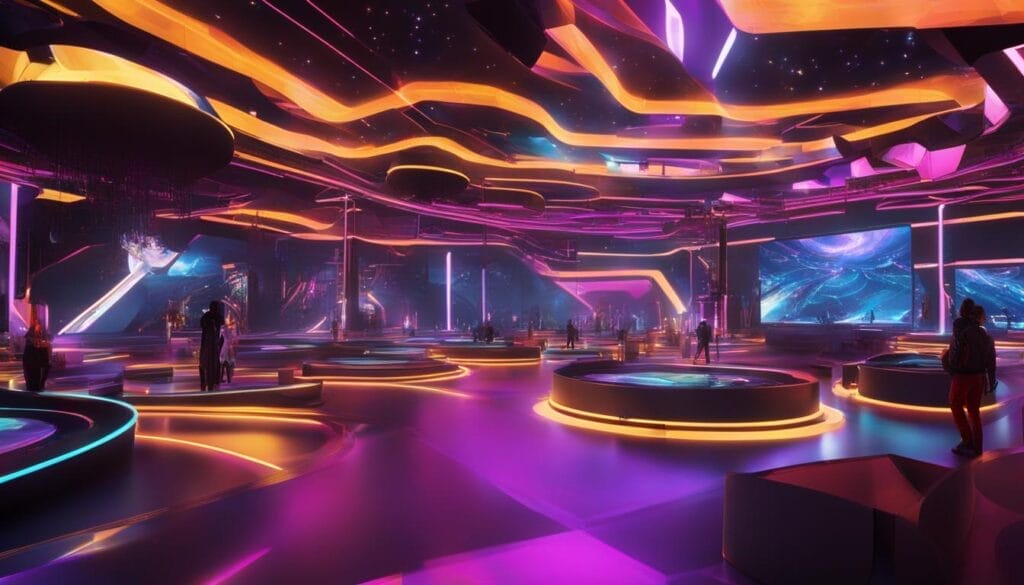
Creating a metaverse event involves careful planning and attention to detail. To ensure a successful and immersive experience, consider the following tips:
1. Define Your Event Goals
Start by clearly defining the goals of your metaverse event. Consider the purpose of the event and how it aligns with your target audience. Are you looking to educate, entertain, or inspire? This will help guide your event design and theme, ensuring a cohesive and engaging experience for attendees.
2. Choose the Right Metaverse Platform
Selecting the right metaverse platform is crucial for the success of your event. Look for a platform that offers the features and capabilities you need to bring your event to life. Consider factors such as user interface, registration process, ticketing options, integrations, and interactivity tools. A platform that provides a customizable virtual space and easy navigation will enhance the overall immersive experience for your attendees.
3. Design a Visually Appealing Virtual Space
The design of your metaverse space plays a vital role in capturing attendees’ attention and keeping them engaged. Create visually appealing and interactive environments that reflect the theme of your event. Utilize 3D elements, captivating visuals, and captivating avatars to enhance the overall immersive experience. Consider leveraging the use of lighting, sound effects, and virtual objects to create a dynamic and engaging virtual space.
4. Integrate Virtual Reality and Augmented Reality Elements
To further enhance the immersive experience, consider integrating virtual reality (VR) and augmented reality (AR) elements into your metaverse event. VR can transport attendees to virtual worlds, allowing them to explore and interact with their surroundings. AR can overlay digital information onto the real world, providing interactive and informative experiences. By incorporating these technologies, you can create a truly immersive and memorable event for your attendees.
By following these tips, you can create a metaverse event that is both memorable and engaging. Keep in mind the goals of your event, select the right metaverse platform, design visually appealing virtual spaces, and integrate VR and AR elements to enhance the overall experience. With the power of the metaverse, you can bring your event to life in a virtual space and create immersive experiences that will captivate your attendees.
Benefits of Metaverse Event Design
Metaverse event design offers numerous benefits for both event planners and attendees. By creating immersive event experiences, attendees are more likely to be engaged and have a memorable experience. The metaverse also provides global accessibility, allowing participants from anywhere in the world to join and participate in events. The customization flexibility of the metaverse allows event planners to create unique and tailored experiences that align with their brand or event theme. Additionally, the interactive nature of metaverse events encourages increased engagement and interaction among attendees, fostering connection and collaboration.
One of the key benefits of metaverse event design is the ability to create immersive event experiences. Through the use of virtual reality and augmented reality technologies, event planners can transport attendees into a whole new world where they are fully immersed in the event. This level of immersion enhances the overall event experience, making it more engaging and memorable.
Another major advantage of metaverse events is their global accessibility. Unlike physical events that require attendees to travel to a specific location, metaverse events can be accessed from anywhere in the world. This not only eliminates the barriers of time and distance but also allows event organizers to reach a much broader audience. Attendees from different countries and time zones can come together in the metaverse to connect and engage.
The customization flexibility offered by the metaverse is also a significant benefit for event planners. With metaverse event design, organizers have the freedom to create unique and tailored experiences that align with their brand or event theme. They can design virtual environments that reflect their vision and create interactive elements that cater to the preferences and interests of their target audience. This level of customization helps to create a more personalized and memorable event experience.
Increased engagement
Finally, metaverse events are known for their ability to foster increased engagement among attendees. The interactive nature of the metaverse encourages participants to actively engage with the event content and each other. Attendees can explore virtual spaces, interact with virtual objects, and connect with other participants using avatars. This increased engagement leads to a more immersive and collaborative event experience, promoting connection and collaboration among attendees.
Marketing Your Metaverse Event
Once you have planned and created your metaverse event, it is important to market it effectively to attract attendees. Social media platforms can be a powerful tool for promoting your event, allowing you to share details and engage with your target audience. Consider creating engaging content, partnering with influencers, and utilizing paid ads to generate interest.
Offering unique NFT rewards can also help generate excitement and incentivize participation. NFTs, or non-fungible tokens, are digital assets that can be bought, sold, and traded. By offering exclusive NFT rewards to participants, you can create a sense of exclusivity and value. These rewards can include limited edition virtual items, exclusive access to virtual spaces, or even real-world merchandise.
Gamification and interactive elements within your event can further engage your audience and create a sense of competition and enjoyment. You can design challenges, quizzes, or virtual scavenger hunts that participants can complete during the event. By incorporating gamification, you can encourage active participation and keep attendees entertained and invested throughout the event.
Finally, find ways to connect with your audience before, during, and after the event by facilitating networking opportunities and providing opportunities for feedback and interaction. Consider hosting virtual meetups or Q&A sessions where participants can connect with speakers, sponsors, and other attendees. By fostering a sense of community and engagement, you can create a lasting impression and build anticipation for future metaverse events.
Social Media Promotion
Social media platforms offer a wide range of tools and features that can help you promote your metaverse event. Create dedicated event pages or groups on platforms like Facebook and LinkedIn, where you can share updates, engage with attendees, and generate buzz. Use hashtags related to your event to increase visibility and reach a wider audience.
Connect with the Audience
Engaging with your audience is crucial for the success of your metaverse event. Encourage attendees to share their experiences on social media by creating hashtags specific to your event. This will not only help generate user-generated content but also increase your event’s visibility and reach. Respond to comments and messages promptly to show that you value attendee feedback and create a sense of community.
| Benefits of Social Media Promotion | Examples |
|---|---|
| Increased event visibility | Event-related hashtags trending on Twitter |
| Targeted audience reach | Facebook ads targeting specific demographics |
| Engagement and interaction with attendees | Responding to comments and messages on Instagram |
| Opportunity for user-generated content | Instagram posts featuring event highlights |
Case Studies of Successful Metaverse Events
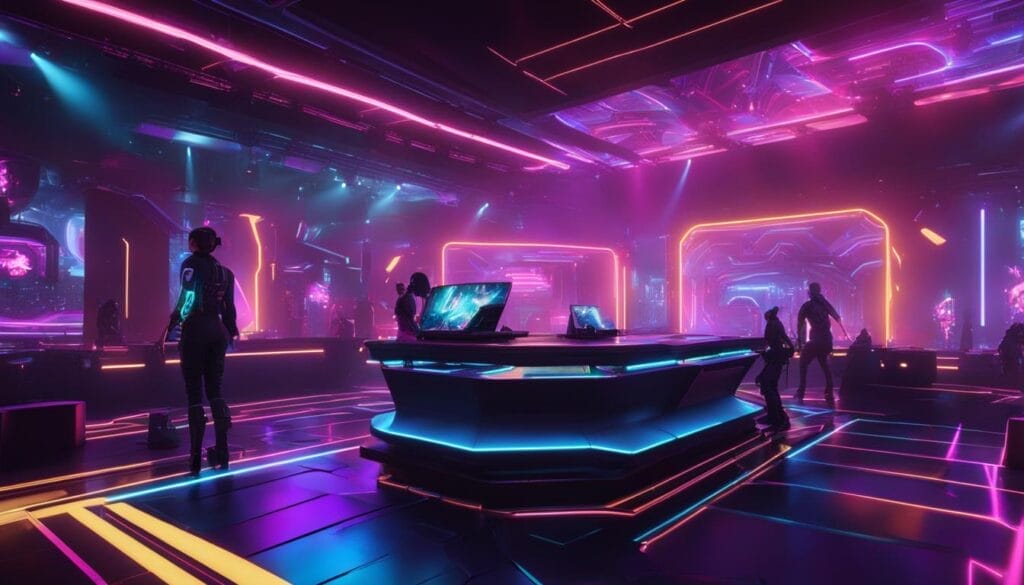
The metaverse has provided a platform for innovative and immersive event experiences. Let’s explore some case studies of successful metaverse events that have pushed the boundaries of creativity and engagement.
Metaverse Fashion Show
The Metaverse Fashion Show revolutionized the way fashion brands showcase their collections. In this virtual runway, designers created stunning digital clothing and accessories that came to life on virtual models. Attendees could explore the virtual fashion show, interact with the designs, and even purchase virtual versions of their favorite pieces. This unique event not only highlighted the talent of fashion designers but also demonstrated the potential of virtual reality in transforming the fashion industry.
Online Art Gallery
The Online Art Gallery provided artists with a virtual platform to exhibit their artwork to a global audience. Attendees could navigate through a digital gallery, admiring and purchasing artwork from various artists. This metaverse event not only eliminated geographical barriers but also offered a unique and immersive way to experience art. Artists were able to connect with art enthusiasts from around the world, expanding their reach and creating new opportunities for collaboration.
Virtual Tour
The Virtual Tour allowed participants to explore virtual environments and destinations from the comfort of their own homes. From historical landmarks to natural wonders, attendees could immerse themselves in lifelike virtual experiences. This metaverse event offered a new way to travel, providing accessibility to destinations that may be difficult to visit in person. The Virtual Tour showcased the potential of virtual reality in bringing the world closer to individuals everywhere.
Virtual Event
The Virtual Event reimagined traditional conferences and trade shows in a digital space. Attendees could interact with virtual booths, attend keynote presentations, and network with other participants from around the world. This metaverse event demonstrated the power of virtual reality in creating engaging and interactive event experiences. By eliminating the need for physical presence, the Virtual Event provided convenience and accessibility for attendees, fostering connections and knowledge sharing.
Comedy & Funny Shows
Comedy & Funny Shows brought laughter and entertainment to the virtual realm. Stand-up comedians and performers embraced the metaverse to deliver their acts to a global audience. Attendees could enjoy live comedy shows, engage with performers, and even participate in interactive comedic experiences. This metaverse event showcased the versatility of virtual reality in creating unique and entertaining experiences outside of traditional performance venues.
Metaverse events offer immersive experiences and endless possibilities.
Future Trends in Metaverse Event Design
As technology continues to advance, the future of metaverse event design looks promising. Advancements in virtual reality and other immersive technologies are driving new possibilities for creating engaging and interactive experiences. The metaverse is evolving into a dynamic platform that offers limitless potential for event planners and attendees alike.
One of the key future trends in metaverse event design is the advancement of virtual reality. As hardware and software become more sophisticated, virtual reality experiences will become increasingly immersive and realistic. This will allow event designers to create virtual environments that are indistinguishable from the real world, providing attendees with truly immersive experiences.
In addition to virtual reality, other technologies such as augmented reality, haptic feedback, and spatial audio are likely to play a significant role in the future of metaverse event design. These technologies will enhance the overall sensory experience for attendees, making events more engaging and memorable.
Furthermore, the integration of artificial intelligence and machine learning in event design and customization will allow for personalized and tailored experiences. Event platforms will be able to analyze attendee preferences and behavior in real time, providing customized content and recommendations. This level of personalization will make metaverse events even more captivating and relevant to each individual participant.
Key Future Trends:
- Advancement of virtual reality technology
- Incorporation of augmented reality, haptic feedback, and spatial audio
- Integration of artificial intelligence and machine learning
Implications for Metaverse Event Design:
- More immersive and realistic virtual environments
- Enhanced sensory experiences for attendees
- Personalized and tailored event experiences
The future of metaverse event design holds exciting possibilities. With advancing technology and innovative tools, event planners will have the ability to create truly immersive and interactive experiences for their attendees. Whether it’s a virtual concert, a trade show, or a corporate event, the metaverse offers endless opportunities for creativity and engagement. As the metaverse continues to evolve, we can expect even more immersive experiences and seamless integration of virtual and physical elements.
Key Considerations for Metaverse Event Planning
When planning a metaverse event, there are several key considerations that event planners should keep in mind. These considerations are crucial for a successful and engaging event that leaves a lasting impression on attendees.
Event Logistics
First and foremost, event logistics play a vital role in metaverse event planning. Event planners need to consider the number of attendees, the duration of the event, and the technical requirements. By carefully assessing these logistics, event planners can ensure that the event runs smoothly and that all attendees have a seamless experience.
Audience Engagement
Audience engagement is another essential factor to take into account when planning a metaverse event. To create an engaging event, consider incorporating interactive elements and opportunities for participation. This could include live Q&A sessions, polls, and interactive exhibits. By actively involving attendees, you can enhance their experience and foster a sense of connection and engagement.
Technical Support
Technical support is crucial for any metaverse event. With the complexities of virtual reality and augmented reality technologies, it is essential to have a dedicated technical support team in place. This team will not only assist in setting up the event but also troubleshoot any technical issues that may arise during the event. By ensuring robust technical support, event planners can minimize disruptions and provide a seamless experience for attendees.
| Key Consideration | Description |
|---|---|
| Event Logistics | Consider the number of attendees, event duration, and technical requirements |
| Audience Engagement | Incorporate interactive elements and opportunities for participation |
| Technical Support | Have a dedicated technical support team to address any technical issues |
By taking into account these key considerations – event logistics, audience engagement, and technical support – event planners can host successful and engaging metaverse events. With proper planning and execution, metaverse events have the potential to create immersive experiences that captivate attendees and leave a lasting impression.
Conclusion
Metaverse event design offers a groundbreaking approach to engaging and connecting with audiences in the digital world. By harnessing the power of virtual reality and augmented reality technologies, event planners can create unforgettable and immersive experiences for attendees. The future of metaverse events holds tremendous potential, with advancements in technology and innovative ideas driving the evolution of event design.
With the ability to transport participants to virtual spaces, metaverse events provide immersive experiences that captivate and inspire. From metaverse music concerts to gaming events and virtual trade shows, the metaverse offers limitless creative possibilities for event planners to explore and utilize.
As technology continues to advance, the metaverse will undoubtedly play a crucial role in the future of event design and engagement. The global accessibility and customization flexibility of the metaverse empower event planners to connect with audiences on a deeper level and create tailored experiences that leave a lasting impression. By embracing the metaverse, events can transcend physical limitations and provide participants with unique and engaging virtual experiences.
So, as you venture into the world of metaverse event design, embrace the immersive power of virtual reality, and let your creativity soar. The metaverse awaits, ready to transform the way we experience and connect through events in the digital age.
FAQ
What is metaverse event design?
Metaverse event design focuses on creating immersive and interactive experiences for attendees using virtual reality and augmented reality technologies.
How does metaverse technology enhance event experiences?
Metaverse technology allows for the creation of virtual spaces or environments where users can interact with each other and digital objects in real time, making events more inclusive and accessible to a global audience.
What types of events can be hosted in the metaverse?
Metaverse events can include virtual events, hybrid events (combining physical and virtual elements), music concerts, gaming or eSports events, expos and trade shows, convocation and award ceremonies, corporate recruiting and job fairs, and product launch events.
How do I host a metaverse event?
The first step is to select a metaverse platform that aligns with your event goals and audience. Then, you can design your metaverse space, create avatars for attendees, and integrate virtual reality and augmented reality elements. It’s also important to have a dedicated web-focused team for event management and technical support.
What tips should I follow when creating a metaverse event?
Consider your event goals and audience, choose a metaverse platform with the right features, design a visually appealing metaverse space, and integrate virtual reality and augmented reality elements for an immersive experience.
What are the benefits of metaverse event design?
Metaverse event design provides immersive experiences, global accessibility, customization flexibility, and increased engagement among attendees.
How can I effectively market my metaverse event?
Utilize social media platforms, create engaging content, partner with influencers, use paid ads, offer unique NFT rewards, incorporate gamification and interactive elements, and facilitate networking opportunities.
Are there any successful examples of metaverse events?
Yes, successful metaverse events include the Metaverse Fashion Show, Online Art Gallery, Virtual Tour, Virtual Event, and Comedy & Funny Shows.
What does the future hold for metaverse event design?
Advancing technology and virtual reality innovations will lead to even more immersive experiences and seamless integration of virtual and physical elements in metaverse events.
What key considerations should I keep in mind for metaverse event planning?
Establish clear event goals, consider logistics, plan for interactive elements, engage a dedicated technical support team, and ensure audience participation throughout the event.

